Brief: This article explains the possible causes and fixes to the Ubuntu Linux error “E: Unable to locate package name”
Understanding “E: Unable to locate Package” Error on Ubuntu
The Linux command line environment has many functionalities. One of its primary roles is the installation and management of Linux software packages. There are several approaches to installing packages on Ubuntu Linux.
One of them is via the apt package manager, which is used to install a Linux package and may or may not always yield results. Due to various to-be-explained reasons, package installation failure via apt may yield the error message E: Unable to locate the package.
The usage of apt for package installation is highlighted by the following syntax:
$ sudo apt install package_name
Consider using apt to install a Linux package called a tree.
$ sudo apt install tree
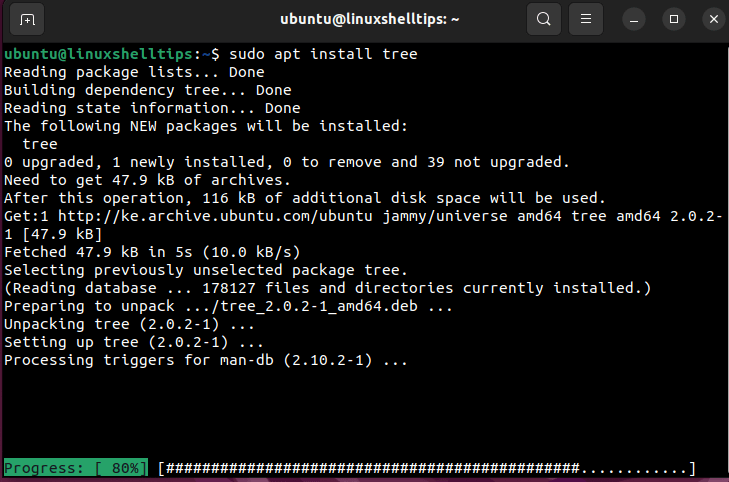
The above screen capture confirms that the installation of this package was a success.
Consider the use of an apt package manager to install a package named vcl.
$ sudo apt install vcl

Possible solutions to the error message E: Unable to locate package can be broken down into the following sections:
1. Check the Ubuntu Linux Package Name
Make sure the name of the package to be installed does not have any typo(s) associated with it. For example, a Linux package like vlc or tree might be mistyped as vcl or trie during package installation attempts.
$ sudo apt install vcl OR $ sudo apt install trie

Also, it is worth mentioning that Linux commands are attributed as case-sensitive. For example, Vim and vim are totally different packages.
$ sudo apt install Vim $ sudo apt install vim
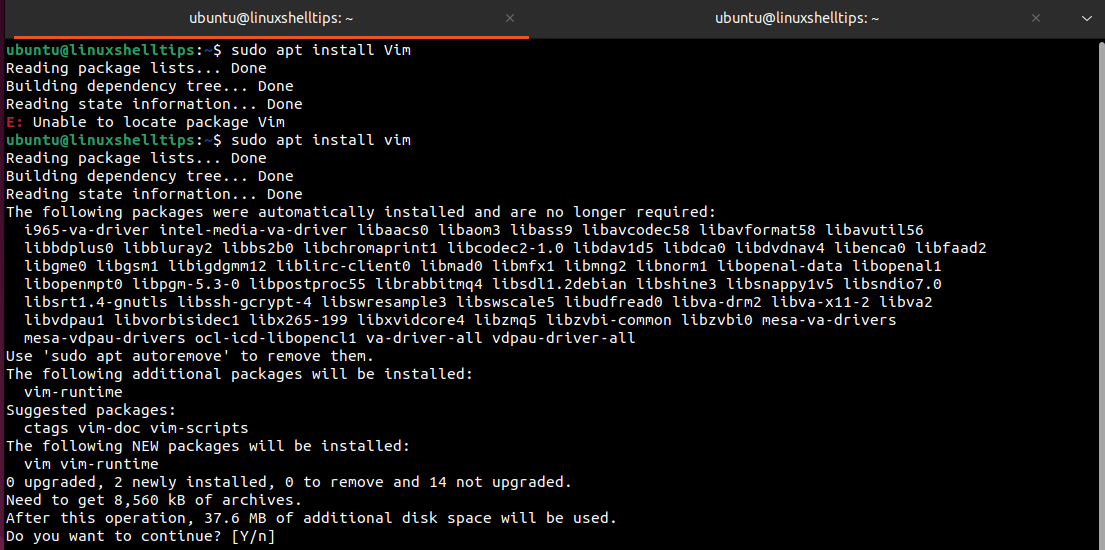
Check on the case sensitivity of the targeted package name before issuing the apt installation command.
Alternatively, confirm the package name’s existence in the apt database using the following syntax.
$ apt search package_name
For example, we can search for the existence of a package like vlc with the following command:
$ apt search vlc
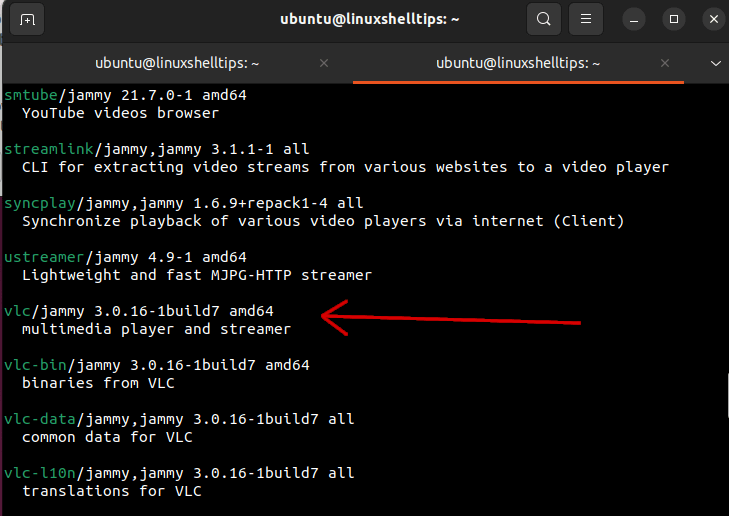
If the package name does not exist in the apt database, we will get an output similar to the following.
$ apt search notepad

The output of the above search result does not provide a match for the notepad package we are trying to install.
2. Have an Up-to-Date Ubuntu Repository Cache
This step is recommended for new users with freshly installed Ubuntu Linux. It however applies to all Ubuntu users. These users need to run the update and upgrade commands:
$ sudo apt update && sudo apt upgrade -y
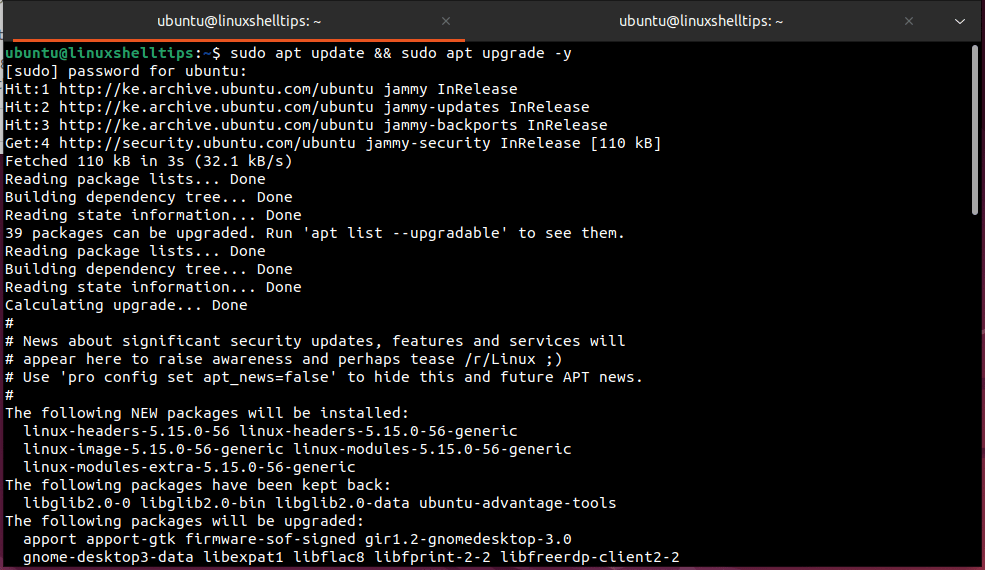
The execution of the above-stated command builds a local cache that accommodates Ubuntu packages (existing and new) viable for installation. Therefore, if the repository cache was out-of-date, new packages and their version information are downloaded by apt and included in the repository cache. In other words, apt installable packages should reside within the repository cache.
After updating the repository cache, try re-installing the targeted package.
3. Check Package Compatibility with Ubuntu
If you are certain of the Linux package’s existence, yet still unable to install it, consider this step. The first assumption here is that the Linux package is accessible in a universe repository not enabled on your Ubuntu system.
A universe repository holds packages not officially supported by the default repository cache. Such packages do not receive security updates and enabling the universe repo grants apt access to these packages.
The second assumption is that the Ubuntu version you are using does not avail of the package. To fix this issue, first, check the Ubuntu version you are using:
$ lsb_release -a

Take note of the Release and/or Codename entries. In the above case, it’s 22.04 and jammy respectively.
Visit the Ubuntu packages website: https://packages.ubuntu.com/
Scroll to the following screen section of the website and fill in the appropriate package-related details.

The above search confirms that the vlc package is available in Ubuntu jammy 22.04 under the Universe repository.
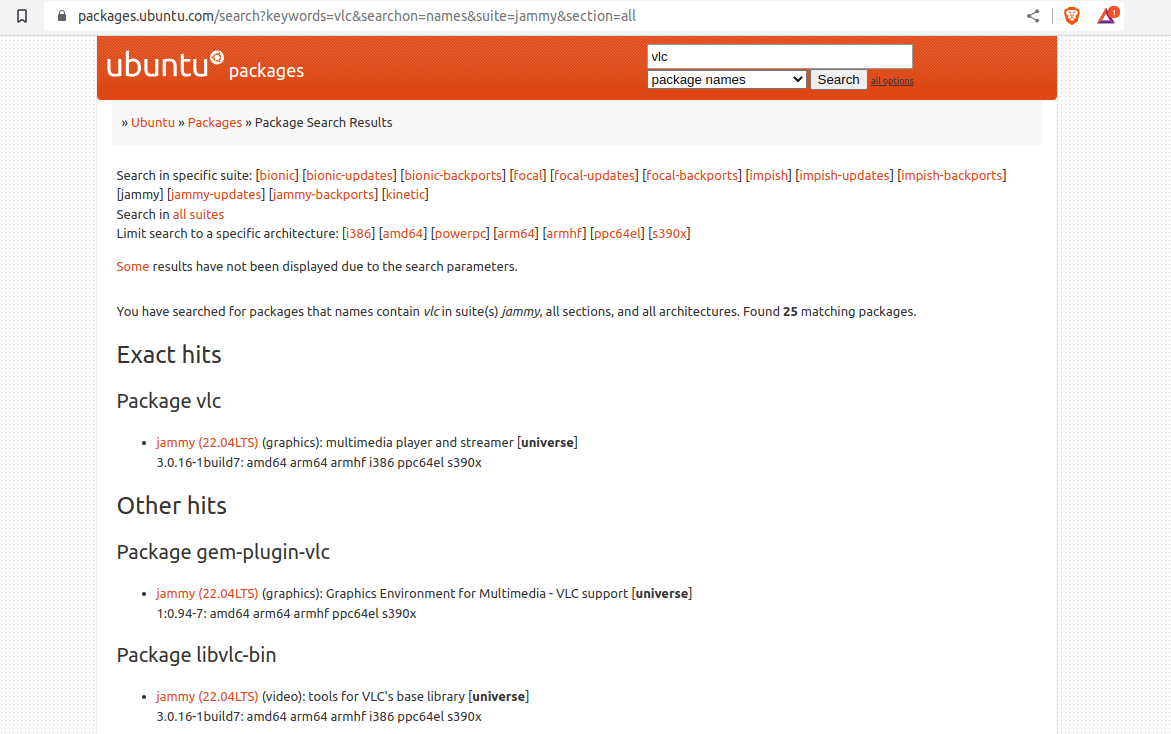
It can therefore be installed from the Linux command line environment. To enable this universe repository on your Ubuntu system, run:
$ sudo add-apt-repository universe multiverse
This command adds the universe and multiverse repositories to our Ubuntu system.

The repository cache needs to be aware of this newly added repository.
$ sudo apt update
Now try to install the vlc package again to fix the installation error.
$ sudo apt install vlc
4. Check Your Ubuntu System Release Status
Ubuntu releases are either regular (9 months of support) or LTS (Long Term Support) with a span of 5 years. Unable to locate package error on Ubuntu sometimes arises when the system is at its end-of-life. This instance makes it impossible to install new packages.
To check the end-of-life date for your Ubuntu system, run:
$ hwe-support-status --verbose

If the system is at its end of life, you might need to consider upgrading to the latest Ubuntu release via the following command sequence:
$ sudo apt autoremove $ sudo apt update && sudo apt upgrade -y $ sudo apt dist-upgrade
Alternatively, you could use the following command sequence:
$ sudo apt install update-manager-core $ sudo do-release-upgrade
From here, you should be able to comfortably test the installation of the targeted Ubuntu package.
$ sudo apt install package_name
To avoid compromising your system, always stick to Ubuntu-provided packages and not random Personal Package Archive (PPA). Also, not all packages are available for installation via an apt package manager.
In such cases, visit the packages’ official web pages for their associated installation instructions. With that said, I hope this article guide solves your “unable to locate package” error on Ubuntu.
